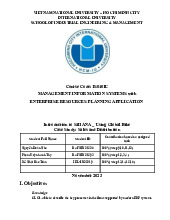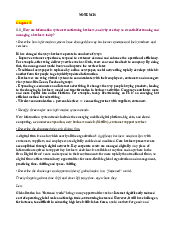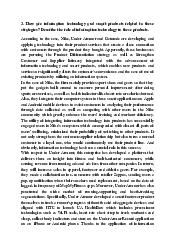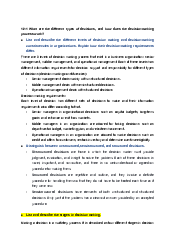


Preview text:
Chapter 4
Ethical and Social Issues in Information Systems
Interactive Session: Facebook Privacy: Your Life for Sale Case Study Questions
1. Perform an ethical analysis of Facebook. What is the ethical dilemma presented by this case?
The stakeholders involved in an ethical analysis of Facebook include Facebook (obviously),
advertisers, device makers, data collecting agencies, Electronic Privacy Information Center (EPIC),
governments and individual users.
Facebook collects an incredible amount of personal data on its users. It is using its ability to track
online activity of its members to develop a frighteningly accurate picture of their lives. It gathers
personal information about users, both with and without their consent, which can be used against
them in other ways. It also collects data of friends of users without their knowledge or consent. All
the data on users and users’ friends is available for sale.
Facebook’s goal is to get its users to share as much data as possible, because the more Facebook
knows, the more accurately it can serve relevant advertisements and thus, charge higher fees to
advertisers. Facebook’s critics are concerned that the repository of personal data of the size that
Facebook has amassed requires protections and privacy controls that extend far beyond those that Facebook currently offers.
2. What is the relationship of privacy to Facebook’s business model?
The less privacy Facebook offers to its users, the more valuable and useful its business model
becomes. By providing more privacy to its users, the less data it collects, stores, and provides to
advertisers. That makes its business model less valuable because advertisements cannot be as
fully developed for individual users.
Facebook CEO Mark Zuckerberg says that people want the world to be more open and connected.
He also wants the world to be more open and connected because his company stands to make more money in that world.
While Facebook has shut down several of its more egregious privacy-invading features, and
enhanced its consent process, the company’s data use policies make it very clear that, as a
condition of using the service, users grant the company wide latitude in using their personal
information in advertising. The default option for users is “opt-in”; most users do not know how to
control use of their information; and they cannot “opt out” of all sharing if they want to use
Facebook. This is called the “control paradox” by researchers: even when users are given controls
over the use of their personal information, they typically choose not to use those controls. Although
users can limit some uses of their information, an advanced degree in Facebook data features is required.
Facebook also had data-sharing partnerships with at least 60 device makers all of whom could
capitalize on the data and make more money for their companies. Data sharing restrictions placed
on software developers from collecting information about customers’ friends did not extend to device makers.
3. Describe the weaknesses of Facebook’s privacy policies and features. What
management, organization, and technology factors have contributed to those weaknesses?
Management: Ninety-three percent of people polled believe that Internet companies should be
forced to ask for permission before using their personal information much like European countries
require. Seventy-two percent want the ability to opt out of online tracking. Executives and
managers must develop policies and procedures that address those concerns at the same time
they are developing a competitive strategy to effectively use personal information to increase the
company’s value to advertisers. Privacy advocate groups like the Electronic Privacy Information
Center want Facebook to restore their more robust privacy settings from 2009. If they do this, some
of its value to advertisers will diminish.
Organization: Facebook’s value and growth potential are determined by how effectively it can
leverage the personal data that is aggregated about its users to attract advertisers. It also stands
to gain from managing and avoiding the privacy concerns raised by its users and government regulators.
Technology: Facebook does not have a good history when it comes to privacy violations and
missteps. This raises doubts about whether they should be responsible for the personal data of
hundreds of millions of people. They have settled lawsuits with the Federal Trade Commission in
which they were barred from misrepresenting the privacy or security of its users’ personal
information. It was charged with deceiving its users by telling them they could keep their
information on Facebook private, then repeatedly allowing it to be shared and made public. They
have also come under fire for collecting information about users who are not logged into Facebook
or do not have accounts with the company. They keep track of activity on other sites that have
“Like” buttons or “recommendations” widgets, and records the time of your visit and your IP address
when you visit a site with those features, regardless of whether or not you click on them.
4. Will Facebook be able to have a successful business model without invading privacy?
Explain your answer. Could Facebook take any measures to make this possible?
Opinions will vary on this question. Certainly, Facebook’s ability to leverage as much as possible
from advertisers may be diminished if it cannot collect every nugget of information about its users
to sell to advertisers. However, it could make up some of the lost revenue by charging users a
premium fee for the company to not collect as much information and restore a higher level of
privacy to those who are willing to pay for it.
For the first time since its founding, Facebook is facing a serious existential crisis, and potentially
a threat to its business model. Facebook’s current crisis follows from a history of privacy abuses
in its short 14-year life. However, there are some signs that Facebook might become more
responsible with its data collection processes, whether by its own volition or because it is forced
to do so. As a publicly traded company, Facebook now invites more scrutiny from investors and regulators.
The company can allow users to view all the data it collects on them and allow them to delete
information they deem necessary. They can also allow users to opt-out of the tracking systems
much like European users already can.
Facebook should continue to explore additional revenue streams outside of what it already has in
advertising. Critics have asked Facebook why it does not offer an ad-free service—like music
streaming sites for a monthly fee. Others want to know why Facebook does not allow users to opt
out of tracking. But these kinds of changes would be difficult for Facebook because its business
model depends entirely on the largely unfettered use of its users’ personal private information,
just as it declares in its data use policy. That policy states openly that if you use Facebook you
agree to their terms of service, which enable it to share your information with third parties. ----- End -----




